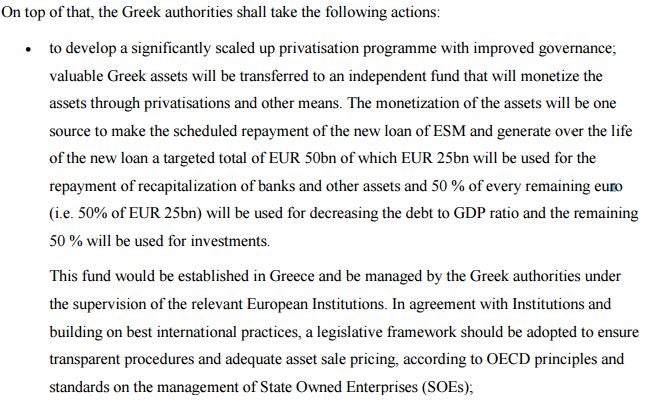Greece debt crisis: The three most important paragraphs of the Greece deal - and what they mean for ordinary Greeks
Germany humiliated Greece - but Greece got concessions into the final text

Support truly
independent journalism
Our mission is to deliver unbiased, fact-based reporting that holds power to account and exposes the truth.
Whether $5 or $50, every contribution counts.
Support us to deliver journalism without an agenda.

Louise Thomas
Editor
European leaders emerged from 17 hours of negotiations with the basis for a bailout deal for Greece, which urgently needs more emergency funding to pay back the money it has borrowed.
It almost never happened. Around 6am on Monday morning, both Angela Merkel, the German Chancellor, and Alexis Tsipras, the Greek prime minister, were heading for the door, according to the FT.
These are the three most telling passages of the agreement:
1. What it says:

What it means:
They disagreed over a 'privatisation fund' that is the backbone of the new agreement. The fund would contain €50 billion earned from the privatisation and sale of public assets – the equivalent of a third of Greece’s income. Tsipras reportedly wanted a smaller fund and for the money to be invested back in the country rather than being used to pay off debt.
Francois Hollande, the French president, is reported to have backed Tsipras. In the end, a compromise was reached whereby half the fund would be used to recapitalise the banks, and the other half will be split between debt repayments and investment.
What it means for the ordinary Greek:
The fund will be result in the privatisation of more Greek assets. Tsipras’s Syriza party was elected in February partly for their commitment to relaunch the state broadcaster ERT. The sell-off of more assets is likely to be deeply unpopular for the public and an about turn for Syriza.
2. What it says:
What it means:
In this passage, Syriza signs up to revisit all the policies it has implemented since the party was elected in February to make sure that none of them run counter to, or against, previously promises made to the Eurozone. It’s tantamount to a full reversal of Syriza governance.
What it means for the ordinary Greek:
It was bad enough that Tsipras went back on the referendum and agreed to a full set of reforms that the Greek people voted against. Now they have to face the possibility that the party and the reforms that they voted for in February must be undone, if they in any way contravene earlier promises made to lenders.
3. What it says:
What it means:
It’s for reasons like that that the deal on the table was billed as a victory for Germany.
But Tsipras’s efforts weren’t completely fruitless. Towards the end of the document there is a paragraph about debt sustainability. The lenders say they are ready to consider measures to make the debt more sustainable, though straight slashing of the debt is impossible.
What it means for the ordinary Greek:
This is a symbolic victory for Tsipras, who has long argued about the need for Greece’s debt to be restructured, fearing that the country will never be able to pay it all off. In a package of reforms that looks like Germany has largely had its way, this small concession will be seen as a triumph.
Subscribe to Independent Premium to bookmark this article
Want to bookmark your favourite articles and stories to read or reference later? Start your Independent Premium subscription today.
Join our commenting forum
Join thought-provoking conversations, follow other Independent readers and see their replies
Comments